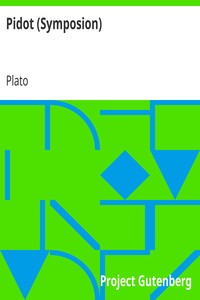Pidot (Symposion) by Plato
"Pidot" by Plato is a philosophical dialogue written in the late 4th century BC. This work explores themes of love and beauty through a series of speeches given by various characters during a banquet, highlighting the nature of Eros—the god of love. The dialogue features notable historical figures from Athens, including Socrates, Agathon, and Aristophanes, each contributing their perspectives on the complexities of love. The opening of "Pidot" introduces us to Apollodoros,
who recounts a prior event involving a dinner party hosted by Agathon. Apollodoros explains how he was asked about the conversations that took place during the gathering, which revolved around discussions of love and Eros. He shares details, such as Socrates' notable absence at the beginning and the specific dynamics of the dinner, setting the stage for the philosophical debates to follow. As he narrates, it becomes clear that the impending speeches will delve into the different manifestations of love, suggesting a rich interplay of ideas among the guests that will unfold throughout the dialogue. (This is an automatically generated summary.)
Read now or download (free!)
| Choose how to read this book | Url | Size | ||||
|---|---|---|---|---|---|---|
| Read online (web) | https://sendtokindle.compellingsciencefiction.com/ebooks/53293.html.images | 188 kB | ||||
| EPUB3 (E-readers incl. Send-to-Kindle) | https://sendtokindle.compellingsciencefiction.com/ebooks/53293.epub3.images | 134 kB |
Send
to kindle email: |
|||
| EPUB (no images, older E-readers) | https://sendtokindle.compellingsciencefiction.com/ebooks/53293.epub.noimages | 136 kB | ||||
| Kindle | https://sendtokindle.compellingsciencefiction.com/ebooks/53293.kf8.images | 243 kB | ||||
| older Kindles | https://sendtokindle.compellingsciencefiction.com/ebooks/53293.kindle.images | 232 kB | ||||
| Plain Text UTF-8 | https://sendtokindle.compellingsciencefiction.com/ebooks/53293.txt.utf-8 | 176 kB | ||||
| Download HTML (zip) | https://www.gutenberg.org/cache/epub/53293/pg53293-h.zip | 133 kB | ||||
| There may be more files related to this item. | ||||||
Similar Books
About this eBook
| Author | Plato, 428? BCE-348? BCE |
|---|---|
| Translator | Lehmuskoski, Niilo, 1888-1948 |
| Title | Pidot (Symposion) |
| Note | Wikipedia page about this book: https: //en.wikipedia.org/wiki/Symposium_(Plato) |
| Note | Reading ease score: 37.5 (College-level). Difficult to read. |
| Credits | Produced by Tapio Riikonen |
| Language | Finnish |
| LoC Class | B: Philosophy, Psychology, Religion |
| LoC Class | PA: Language and Literatures: Classical Languages and Literature |
| Subject | Classical literature |
| Subject | Socrates, 470 BC-399 BC |
| Subject | Philosophy, Ancient |
| Subject | Love -- Early works to 1800 |
| Category | Text |
| EBook-No. | 53293 |
| Release Date | Oct 16, 2016 |
| Copyright Status | Public domain in the USA. |
| Downloads | 64 downloads in the last 30 days. |
| Project Gutenberg eBooks are always free! | |

